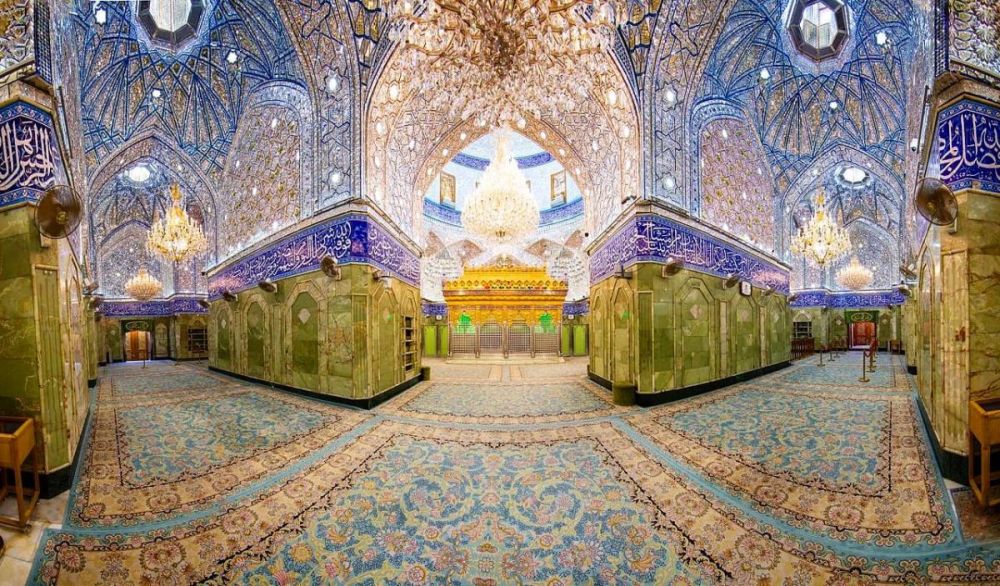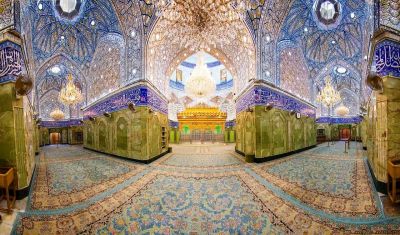

The Al-Abbass Shrine, dedicated to the brother of Imam Hussein, is a historically significant and highly revered site for pilgrims. The magnificent golden dome and minarets of the mausoleum stand majestically, inviting visitors to experience its sacred atmosphere. Guests are welcomed to observe and participate in the cultural practices and religious rites taking place. Beautifully decorated with intricate Islamic calligraphy and mirror work, the shrine provides a serene environment for reflection. Visitors often find themselves in awe of the spiritual ambiance and the sense of unity amongst the pilgrims. While photography inside the sanctum is generally restricted, the exterior of the shrine is a subject of admiration and can be captured to preserve the memory of your visit. Whether you come for worship or cultural understanding, a visit to the Al-Abbass Shrine is a profound and moving experience that resonates with many.
The Imam Hussein Shrine, a site of immense religious and cultural significance, stands as a beacon of piety and devotion for countless visitors. As the final resting place of Imam Hussain ibn Ali, the grandson of Prophet Muhammad, this shrine is at the heart of the holy city of Karbala. The visit typically involves a tour around the majestic structure adorned with intricate artwork, gold, and reflections of devout craftsmanship. Pilgrims partake in various spiritual practices, including prayers and recitations that echo through the courtyards. Within the shrine complex, visitors will also find a museum showcasing artifacts, manuscripts, and historical items. While here, you can immerse in the peaceful chants and rhythms of religious devotion that have resonated within these walls for centuries. This activity delivers not only a religious encounter but also a deep cultural insight into the rich tapestry of Islamic history.
Situated near the Shrine of Imam Hussein, this museum houses a vast collection of historical items associated with the Battle of Karbala and the life of Imam Hussein. It provides an educational journey for visitors to appreciate the significance of these relics within Islamic history. The museum's exhibits are carefully preserved and showcased with detailed explanations, offering insight into the culture and heritage of the region. As you explore the different galleries, you can expect to see ancient manuscripts, weapons from the era, traditional clothing, and personal belongings of key historical figures. The Museum of Imam Hussein serves as both a memorial and an informative space for those keen to learn more. Tour guides are available to provide context and answer questions, enhancing the educational value of your visit.
An activity steeped in tradition and spirituality, the Walk of the Stations of Arba'een is a pilgrimage that retraces the steps of those who walked from Najaf to Karbala to honor Imam Hussein. Participating in this walk is an expression of solidarity and commemoration of the martyrs of Karbala. Each station along the route provides sustenance and spiritual support to the pilgrims. The walk itself is a profound personal and communal journey of reflection, prayer, and connection with fellow walkers. The pilgrimage culminates at the Al Qibla Courtyard, marking the end of an emotionally and physically demanding experience. The walk can last for several days, depending on the starting point, and is an enduring testament to the enduring legacy of Imam Hussein.
Experience spirituality in the serene setting of Al Qibla Courtyard through the Quranic recitation sessions held regularly within the vicinity of the holy shrines. These sessions are moments of profound contemplation and cultural immersion where reciters with melodious voices bring to life the verses of the Holy Quran. The chanting resonates through the courtyard, enveloping participants in a cloak of tranquility and peace. Whether you choose to recite along or simply listen, these sessions are a powerful way to connect with the faith and understand the importance of the Quran in Islamic culture. Recitation sessions are a communal activity that welcomes everyone, offering a spiritual embrace to visitors amidst the grandeur of Karbala's religious monuments.
As dusk falls upon Karbala, the Al Qibla Courtyard and surrounding shrines transform into an illuminated spectacle. Visitors can participate in the nighttime illumination experience, witnessing the breathtaking sight of golden domes and minarets sparkling under the night sky. The effect is created by strategic lighting, emphasizing the architectural beauty and spiritual prominence of the shrines. This experience invites visitors to partake in the evening prayers or to simply meander through the courtyard, soaking in the peaceful ambiance and the sense of timelessness that pervades the area after dark. For many, this is an opportunity for contemplation and photography, capturing the essence of Karbala's sacred landscape. The nighttime illumination adds a distinct and mystical character to the religious sites, etching an unforgettable memory for those who witness it.
Embark on a gastronomic adventure and experience the local flavors of Karbala by participating in a local cuisine tasting activity. The Al Qibla Courtyard is surrounded by numerous food vendors serving traditional Iraqi dishes that reflect the rich culinary heritage of the region. Savor the taste of delicacies like masgouf (grilled fish), kebabs, and biryani. Sample a variety of bread such as Samoon and Khubz, which are staple accompaniments to most meals. No culinary exploration is complete without tasting local sweets like baklava or the famous Iraqi date pastries. This activity is not only a feast for the palate but also provides cultural insights into the importance of food in social and religious gatherings.
Immerse yourself in the local culture by participating in workshops often held in the vicinity of the Al Qibla Courtyard. These workshops can range from calligraphy, where you learn the art of beautiful writing that adorns Islamic architecture, to pottery and textile making, reflecting Iraq's rich artisanal traditions. Engaging in these workshops provides a hands-on opportunity to understand and appreciate the intricacy and skill involved in creating traditional crafts. Expert artisans lead the workshops, sharing their knowledge and passion for their craft. Participants leave with not only a deeper appreciation for the local art forms but also with unique handmade souvenirs of their own creation.
For photography enthusiasts, the Shrine Photography Tour offers a chance to capture the architectural splendor and intricate details of the holy sites around Al Qibla Courtyard. Participants explore various angles and perspectives under the guidance of a local photographer who shares tips on capturing the best light and composition. This tour is a blend of cultural appreciation and artistry, as photographers aim to frame not only the physical beauty of the shrines but also the emotional and spiritual aura that they exude. While respectful of the sanctity of the sites, photographers find creative ways to document the interplay between the devout, the architecture, and the sacred atmosphere of Karbala.
Join the local community and visitors from around the world for the evening prayer in the Al Qibla Courtyard. The air fills with a sense of devotion as the Adhan (call to prayer) resounds across the courtyard, inviting all to partake in this daily ritual. This activity is not limited to religious participants; visitors can also engage in personal reflection or simply observe the practice as a cultural experience. The collective energy of the praying crowd adds a profound sense of peace and community. The evening prayer in Karbala, especially against the backdrop of the golden-domed shrines, leaves an indelible impression of the spiritual heart of this historic city.
